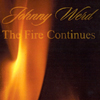Johnny Werd: The Fire Continues, by Q. Synopsis

Description
Johnny Werd, the Fire Continues is a novel American novel from the twilight of the twentieth century. Retelling the story of a boy and his fire, this fragmented collection of episodes from the lives of Johnny Werd features all the worst aspects of both modern and postmodern fiction. It is to laugh.
Paperback; ISBN: 0972424423; $10
Hardcover; ISBN: 0972424415; $25
Warning: Johnny Werd contains graphic and explicit textuality.
Links
Reviews
Every generation reinvents Holden Caulfield, the misfit resisting the onset of complacency and banality, the lost cause locked on pause, sahdowed too early by the absurdity of inevitable mortality. Johnny Werd, unable to commit to his education, haunted by a sister’s suicide, intrigued by the energy of setting things aflame, ia a post-Gen-X Holden, the generation nurtured by television and sugared cereal, their myths drawn from Star Wars and their humor from the Simpsons, their childhood defined by Sesame Street, their adolescence by the cool lure of recreational narcotics—each channeled by Johnny’s “voice,” itself an unsettling ventriloquism that splits point of view into points of views. Although this slender experiment riotously spoofs traditional narrative, it is nontheless unsettling. Holden at his loneliest had the refuge of his own narrative, the comfort of an unfolding plot, the reassuring stability of his nnarrating voice, the block of chapters and the rhythm of sentences, and always a sympathetic reader. Not so here. Johnny Werd is left without a real-world environment—he thrives within the fuselage-world of his own language constructions in a “narrative” itself dismissive of storytelling. And, in the end, he is left lonelier than Holden ever could be: the isolate comforted by the kinetic tapping of his own keyboard. We eavesdrop, we read—although our invitation is presumptive, our presence intrusive. This is finally an exorcise/exercize of words, a desperate/exuberant, private act of revisiting form. Plot collapses into paragraph premises, characters are word-chords, sentences explode into Joycean sonic events, sinuous patterns of exotic diction and unrestricted syntax. But there lurks a strained uneasiness over the performance, a terror over a depthless world that has justified such audacious refuge. A narrative so given to the pyrotechnics of language closes with a most unsettling concession: “Give me some text with silences in it.”
- Joseph Dewey, Review of Contemporary Fiction (Spring 2004)
Bibliographic Details
Published 0000-00-00 by Spineless Books. ISBN: 978-0-9801392-6-6. Distributed by Ingram.
Binding: Cloth / Case Laminate / Perfect Bound$25.00
Cover art by Andrew Byrom.